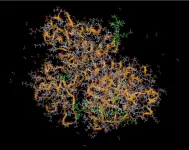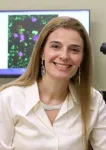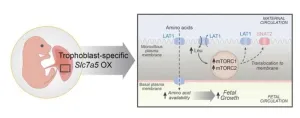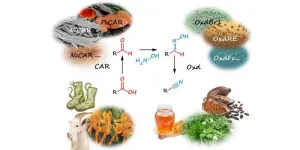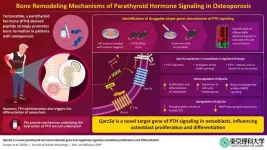(Press-News.org) PHILADELPHIA—The Pew Charitable Trusts today announced the 2024 class of the Pew Latin American Fellows Program in the Biomedical Sciences.
The 10 postdoctoral fellows from six Latin American countries—Argentina, Brazil, Chile, Cuba, Mexico, and Peru—will receive two years of funding to conduct research in laboratories across the United States. They will work under the mentorship of prominent biomedical scientists, including alumni from the Latin American fellows program and the Pew Scholars Program in the Biomedical Sciences.
“The grave threats to human health over the past few years—from COVID-19 to growing rates of cancer in younger adults—underscore how important it is to invest in promising biomedical scientists throughout the world,” said Donna Frisby-Greenwood, Pew’s senior vice president for Philadelphia and scientific advancement. “These outstanding Latin American researchers are poised to become leaders in the global scientific community, and Pew is proud to support them.”
Fellows who choose to return to Latin America to launch their own research labs will receive additional funding from Pew. Approximately 68% of program participants have pursued this path, which has helped to build a more robust biomedical research community in Latin America.
Research interests in the 2024 class include exploring how mosquitoes detect human targets and transmit disease, engineering specialized RNA molecules to help ward off neurodegeneration, and investigating methods to activate a powerful anti-cancer protein that can prevent tumor growth.
“Biomedical research is a global effort, and collaborations that bring together different personal perspectives across scientific disciplines are key to making meaningful change,” said Eva Nogales, Ph.D., distinguished professor in the Department of Molecular and Cell Biology at the University of California, Berkeley, and chair of the program’s national advisory committee. “I’m thrilled to welcome this year’s class, a group of exceptional Latin American scientists with immense talent. Their research in top labs will help pave the way for scientific discovery that can benefit human health across the globe.”
The 2024 Pew Latin American fellows and their U.S. mentors are:
Nagif Alata Jimenez, Ph.D.
Laboratory of Marcos Simoes-Costa, Ph.D., 2008 Pew Latin American fellow
Boston Children’s Hospital, Harvard Medical School
Nagif Alata Jimenez, Ph.D., will investigate the molecular programs that guide the formation of specialized cells during embryonic development.
Krist Antunes Fernandes, Ph.D.
Laboratory of Ai Ing Lim, Ph.D.
Princeton University
Krist Antunes Fernandes, Ph.D., will study how eradication of parasitic infections has shaped the immune system, especially during pregnancy, and fostered the development of asthma and respiratory infections.
Carolina Cabalín, Ph.D.
Laboratory of Niroshana Anandasabapathy, M.D., Ph.D.
Weill Cornell Medicine
Carolina Cabalín, Ph.D., will explore how cancer-targeted drugs that stimulate immunity can trigger autoimmune disorders such as the skin condition vitiligo.
Florencia Fernandez-Chiappe, Ph.D.
Laboratory of Meg Younger, Ph.D., 2024 Pew biomedical scholar
Boston University
Florencia Fernandez-Chiappe, Ph.D., will assess how the unusual structure of a mosquito’s olfactory system allows it to detect a human’s signature scent.
Jovanka Gencel-Augusto, Ph.D.
Laboratory of Jennifer R. Grandis, M.D.
University of California, San Francisco
Jovanka Gencel-Augusto, Ph.D., will determine alternative strategies to activate p53, a protective protein that can be harnessed to defend against cancer.
Gladys Gutiérrez-Bugallo, Ph.D.
Laboratory of George Dimopoulos, Ph.D., MBA
Johns Hopkins University Bloomberg School of Public Health
Gladys Gutiérrez-Bugallo, Ph.D., will explore the factors that allow female mosquitoes to pass viruses to their progeny.
Mateo Alejandro Martínez-Roque, Ph.D.
Laboratory of Samie R. Jaffrey, M.D., Ph.D.
Weill Cornell Medicine
Mateo Alejandro Martínez-Roque, Ph.D., will pursue the development of “glue RNAs” that can be used to guide the degradation of abnormal proteins, which can lead to diseases such as amyotrophic lateral sclerosis.
Felipe Méndez-Salcido, Ph.D.
Laboratory of A. Kimberley McAllister, Ph.D., 2001 Pew biomedical scholar
University of California, Davis
Felipe Méndez-Salcido, Ph.D., will explore how dysregulation in dopamine signaling can drive the altered cognitive behaviors characteristic of schizophrenia.
Brenda Nakagaki, Ph.D.
Laboratory of Evanna Mills, Ph.D., 2024 Pew biomedical scholar
Dana-Farber Cancer Institute, Harvard Medical School
Brenda Nakagaki, Ph.D., will investigate how the metabolic dysfunction that accompanies diet-induced obesity triggers inflammation in different cells and tissues.
Guido Petrovich, Ph.D.
Laboratory of Josefina del Mármol, Ph.D., 2023 Pew biomedical scholar
Harvard Medical School
Guido Petrovich, Ph.D., will dissect the molecular mechanisms by which the insects that transmit Chagas disease locate their human hosts.
Founded in 1948, The Pew Charitable Trusts uses data to make a difference. Pew addresses the challenges of a changing world by illuminating issues, creating common ground, and advancing ambitious projects that lead to tangible progress.
END
Pew funds 10 Latin American scientists conducting biomedical research
2024-06-18
ELSE PRESS RELEASES FROM THIS DATE:
Accelerating drug discovery with the CCDC, AWS, and Intel
2024-06-18
Thanks to the combined computing power of Amazon Web Services (AWS) and Intel, the CCDC announces that a potentially significant advancement in drug discovery has been achieved. A curated data set of protein structures from the Protein Data Bank (PDB) with predicted hydrogen positions is now available for download. This project was supported by an Intel RISE Technology Initiative contribution.
Historically, collaborations with the pharmaceutical industry have enabled the development of reliable methods for interpreting interactions within protein binding sites using proprietary information not publicly available. Repeating these studies ...
Updates from the 2022 WHO classification of kidney epithelial tumors
2024-06-18
Renal tumor pathology has evolved considerably, expanding from two main types of renal malignant tumors to over 20 distinct types. Diagnostic criteria have advanced from purely morphological features to include histochemistry, immunohistochemistry (IHC), and molecular genetics. The World Health Organization (WHO) and the International Society of Urologic Pathology (ISUP) have been instrumental in updating these criteria, resulting in a comprehensive framework essential for accurate diagnosis, effective treatment, and improved patient outcomes.
The field of renal tumor pathology has undergone ...
Interdisciplinary team at MUSC Hollings Cancer Center maps role of P. gingivalis in drug resistance
2024-06-18
A new paper from an interdisciplinary team at MUSC Hollings Cancer Center describes how the bacteria Porphyromonas gingivalis interferes with chemotherapy-induced mitophagy, allowing oral cancer tumors to become resistant to the drug’s effects.
Besim Ogretmen, Ph.D., SmartState Endowed Chair in Lipidomics and Drug Discovery in the College of Medicine, and Ӧzlem Yilmaz, D.D.S., Ph.D., a professor, clinician-scientist and microbiologist in the College of Dental Medicine, worked with graduate ...
Astronomers see a massive black hole awaken in real time
2024-06-18
In late 2019 the previously unremarkable galaxy SDSS1335+0728 suddenly started shining brighter than ever before. To understand why, astronomers have used data from several space and ground-based observatories, including the European Southern Observatory’s Very Large Telescope (ESO’s VLT), to track how the galaxy’s brightness has varied. In a study out today, they conclude that they are witnessing changes never seen before in a galaxy — likely the result of the sudden awakening of the massive black hole at its core.
“Imagine you’ve been observing a distant galaxy for years, and it always seemed calm and inactive,” ...
A review and update on therapy of gastrointestinal tract tumors: from the bench to clinical practice
2024-06-18
Gastrointestinal (GI) cancers, encompassing esophageal, gastric, small bowel, and colorectal carcinomas, represent a significant global health burden due to their high incidence and mortality rates. This review by M. Jesús Fernández-Aceñero et al. provides an in-depth analysis of the molecular characteristics, prognosis, and current therapeutic strategies for these malignancies, highlighting the latest advancements and challenges in the field.
Esophageal carcinoma is among the ten most prevalent tumors globally, with squamous cell carcinoma (SCC) being the most common subtype. ...
Study suggests hepatitis E may be a sexually transmitted infection
2024-06-18
COLUMBUS, Ohio – Discovering that hepatitis E virus is associated with sperm in pigs suggests the virus may be both sexually transmitted and linked to male infertility, according to a new study.
Hepatitis E (HEV) is the leading cause of the acute viral liver infection in humans worldwide, mostly in developing regions where sanitation is poor. The virus is also endemic in pigs in the United States – though it is present mostly in organs rather than muscle, and is killed when the meat is cooked.
Because HEV has been linked to fatal pregnancy complications and reports of male infertility ...
Investigating the causes of fetal growth disorders
2024-06-18
Common complications of pregnancy affecting fetal size may be caused by irregularities in the transport of amino acids across the placenta—a finding with therapeutic implications. Intrauterine growth restriction (IUGR) and fetal overgrowth affect 15-20% of pregnancies worldwide. Abnormal fetal growth is strongly linked to the development of obesity, diabetes, and cardiovascular disease in later life. Placental transport of essential amino acids is decreased in human IUGR and increased in fetal overgrowth, but whether this was a cause or consequence was unclear. Fredrick Rosario-Joseph and colleagues created a line of mice ...
Enzymes instead of cyanide: Researchers develop biocatalytic process for nitrile production
2024-06-18
If the household cleaner emits a lemon-like odour, this may be due to a nitrile called citronellyl nitrile. These versatile chemical nitrile groups are also used in the manufacture of active pharmaceutical ingredients, superglue and chemical-resistant gloves. The prevalent production process used so far has required a chemical reaction of certain molecules with highly toxic cyanide. Margit Winkler from the Institute of Molecular Biotechnology at TU Graz, together with Ludmila Martínková from the Institute of Microbiology at the Czech Academy of Sciences, ...
New study reveals promising drug target for treating osteoporosis
2024-06-18
Osteoporosis is a skeletal condition that leads to the weakening of bones, making them porous, fragile, and prone to breakage. A whopping 8.9 million fractures are caused by osteoporosis annually, with one fracture occurring every three seconds! The aging population is the most vulnerable to primary osteoporosis, given, their frailty, and often, requires long-term therapy and support. Advances in healthcare and the corresponding rise in the aging population have put a strain on available resources, underscoring the need for effective therapies against osteoporosis.
Induction of parathyroid hormone (PTH) signaling using the PTH-derived ...
Breakthrough may clear major hurdle for quantum computers
2024-06-18
The potential of quantum computers is currently thwarted by a trade-off problem. Quantum systems that can carry out complex operations are less tolerant to errors and noise, while systems that are more protected against noise are harder and slower to compute with. Now a research team from Chalmers University of Technology, in Sweden, has created a unique system that combats the dilemma, thus paving the way for longer computation time and more robust quantum computers.
For the impact of quantum computers to be realised in society, quantum researchers first need to deal with some major obstacles. So far, errors and noise stemming from, for example, ...
